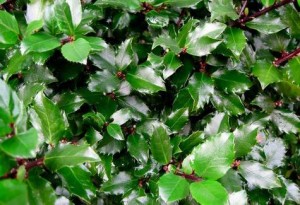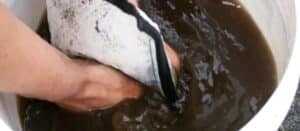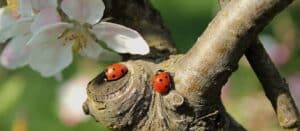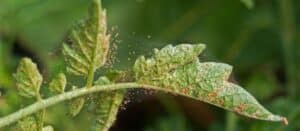As temperatures cool and winter weather approaches, it’s time to think about protecting your vulnerable and valuable shrubs from the wind, snow, ice, and frigid temperatures to come. While not all shrubs and landscape plants need additional protection to survive the winter, some will greatly benefit from a few simple protective measures.
First, Inspect Your Shrubs
Before winter arrives, spend some time outdoors examining your shrubs and considering the following:
- Are there any lingering pest or disease problems that would put the shrub at a disadvantage over the winter?
- Is the shrub exposed to winter winds, sun, road salt, or snowbanks?
- Has the shrub been adequately watered all season, or are there signs of drought stress?
- Does the shrub have any broken branches or other damage?
- Are the roots exposed or damaged in some way?
- Has it been recently and severely pruned, leaving it with fewer of the outer, protective leaves?
- Have any nearby plants or structures recently been removed, leaving it more exposed than it was last winter?
- Was the shrub planted in the last two years?
- Is the shrub “pushing the zone” or planted at the edge of its normal growing zone?
- Are soil conditions optimal to support your shrubs through the winter (well-draining, moisture-retentive, and nutrient-rich)?
- Do browsing animals, such as deer, or rodents have easy access to your shrubs?
Answers to these questions will help you determine the level of protection individual shrubs will need over the winter.
If you’re uncertain about any of the above, give the friendly team at Organic Plant Care a call – we’ll be happy to help you!
Next, Put Winter Protection in Place
Once you understand the condition and needs of your shrubs, it’s time to choose which protective measures to take. Here are the four things we recommend doing before winter arrives:
- Fertilize shrubs and landscape beds to improve winter survival
- Apply soil conditioner (compost tea) to improve winter moisture retention
- Apply an anti-desiccant treatment to broadleaved evergreen shrubs and others that are vulnerable to winter burn
- Protect shrubs from deer browsing with deer repellent applications
Fertilize In Fall

Shrub treatment by OPC at Trump National Golf Course
Properly mineralized and balanced soil improves root development, nutrient and sugar translocation, water uptake and release, disease/insect resistance, and winter hardiness. In other words, if you fertilize shrubs in fall, they’ll be better able to handle whatever winter throws at them.
Check out our Plant & Soil Biotics program. It includes a complete soil analysis (so we know exactly what amendments your soil needs to keep shrubs healthy) and both spring and fall fertilization and compost tea applications.
Deep root fertilization is a process that puts nutrients (and moisture) right where shrubs and trees need it most – in their root zone.
Use Compost Tea To Spray Leaves & Drench Soil
Compost tea helps build a healthy Soil Food Web that, along with good soil and organic matter, improves soil’s water-holding capabilities. By applying compost tea in fall, you’ll help ensure your shrubs have enough moisture to make it through winter.
>> Learn more about the benefits of compost tea
Spray Broadleaf Evergreens with Anti-Desiccant

Holly with anti-desiccant winter protectionMany shrubs, especially broadleaf evergreens like hollies, boxwood, laurels and rhododendrons, can be easily damaged by brutal winter weather. Instead of lush green leaves, you end up with crispy brown ones.
You’ve probably seen rhododendrons, laurels and boxwood with brown, crispy leaves in spring. But you can help minimize the risk of that happening by applying an anti-dessicant spray in late fall.
Plants respire, or release water through their leaves, as a byproduct of photosynthesis. Since evergreens keep their leaves, they continue to lose water through their leaves during the winter. When exposed to drying winds, severe drought periods, or when the ground is completely frozen (as it often is during NJ and PA winters), they may have difficulty replacing that water loss. The end result is brown and dehydrated foliage or needles, often called winter burn.
Shrubs Affected by Winter Burn
Shrubs that are most affected by winter desiccation are evergreens with broad leaves.
Some of the more common broadleaf evergreens in central New Jersey and eastern Pennsylvania include:
- Andromeda (Pieris japonica)
- Aucuba (Aucuba japonica)
- Camellia (Camellia)
- Euonymous or Wintercreeper (Euonymous spp.)
- Firethorn (Pyracantha coccinea)
- Gardenia (Gardenia spp.)
- Hardy Boxwood (Buxus )
- Heavenly Bamboo (Nandina domestica)
- Holly (Ilex)
- Leatherleaf Viburnum (Viburnum rhytidophyllum)
- Leucothoe (Leucothoe)
- Mahonia (Mahonia )
- Mountain Laurel (Kalmia latifolia)
- Privet (Ligustrum ovalifolium)
- Rhododendron (Rhododendron spp.)
Some deciduous shrubs with sensitive stems, such as roses and hydrangea, can also benefit from anti-desiccant spray.
A few conifer species that are at the edge of their growing zone may also do better with protective treatments over the winter. These include certain species of:
- Cedar
- Juniper
- Arborvitae
- Pine, and
- Cypress
If any of your shrubs have experienced winter desiccation in the past, talk with our Landscape Professionals about how to protect them this winter.
Depending on the severity of the winter, one or two applications of an organic anti-desiccant spray, such as Vapor Guard, helps reduce some of the moisture loss and resulting winter burn.
⇒ WINTER SHRUB PROTECTION SPRAY TREATMENT
Protect Shrubs From Deer Browsing

Winter protection will save your shrubs from browsing by hungry deer.
During severe winters, deer will eat just about anything, even shrubs that are toxic or spiny.
Monthly deer repellent sprays are highly effective in deterring deer browsing during the peak months of December through March. We rotate our products to keep deer from developing a tolerance.
For best protection, you’ll want to start applying deer spray in late fall.
> Learn more about deer repellent – does it really work?
⇒ WINTER DEER REPELLENT TREATMENT
Need a Hand?
If you’d like us to take a look at your shrubs and recommend the best approach to keep them healthy this winter, just give us a call. We’re happy to provide you with a free property analysis and quote for winter shrub protection.
GET THE LATEST NEWS
Subscribe to the Organic Plant Care Newsletter and get timely and helpful tips and updates monthly.
There's no spam - we promise!






